新人教版高中英语必修2Unit 4 History and Traditions-Listening&Speaking&Talking教案一
-
- 页数:5页
- 字数:约 9589 字
- 大小:164.24KB
- 格式:.docx
- 版本:Office2016及以上版本
- 作者:藍霈悦ppter
Unit 4 History andTraditions-Listening & Speaking & Talking教学设计
This unit is abouthistory and traditions. From the opening page, we can know that this unit willintroduce the history and traditions around the world. As Marcus Garvey says “Apeople without the knowledge of their past history, origin and culture is likea tree without roots”, it is important for students to realize the importanceand value of knowing the history and traditions and their further meanings. Andthis part ( listening and speaking ) is divided into two parts: Part A---shareviews on historic sites, Part B ---talk about a visit to a historic touristdestination. By talking with a foreigner, the speakers introduce the historicattractions and their cultures.

Part A is that William, a British student, who was going to visit the Confucius Temple anda Chinese student, Xiao Kong, who was going to the Confucius Temple to meetwith the members of the research group, went together and exchanged their viewson the Confucius Temple, Confucius, Confucius descendants and Confuciuseducational thoughts. Part B is a conversation between Xiao Yan, a youth hostelreceptionist and Paul, a backpacker about the feelings and experience aftervisiting the Chinese famous tourist attraction Pingyao.
1. Guide students to understand the content of listening texts in termsof the whole and key details;
2. Cultivate students ability to guess the meaning of words inlistening; discuss with their peers how to talk about historic spots and greatperson.
3. Instruct students to use functional sentences of showing one’s excitement,surprise and disappointment.
1. Guide students to understand the content of listening texts in termsof the whole and key details;
2. Cultivate students ability to discuss with their peers the relatedtopics.
3. Enable students to use the functional items of showing one’sexcitement, surprise and disappointment.
Part A Listening and Speaking--- Share viewson historic sites
Step 1 Lead in
Look at some photos of Qufu. What can you say about theseplaces?
Temple of Confucius Kong Family Mansion Cemetery of Confucius
Theseplaces were built to honour the ancient Chinese educator, thinker andphilosopher Confucius, w
Theyare in Qufu, Shandong province , which has become now one of the most famoustourist attractions.
Step 2 Before listening
1.Look at the pictures above and predict what the content is about.
It is about introduction aboutConfucius and even may be his influence to the Chinese culture and development.2.The new words
philosopher n. 哲学家 descendant n. 后裔,后代,后人;子孙
philosophy n. 哲学 noticeable adj. 显著的,显而易见的Step 3 While listening---Task 1
Listen to a conversation between a Britishtourist and a Chinese student in Qufu, and then write down what they say aboutConfucius.
Fact/Opinion about Confucius
William
1. Confucius is one of his favorite philosopher.
2. He was a wise man.
3. He lived over 2,500 years.
Xiao Kong
1. Confucius has over 3,000,000 descendants.
2. He was a great educator and had many ideas about education.
3. He was one of the greatest minds in history.
Step 4 While listening --- Task 2
Listen again and decide whether these statements aretrue(T), false(F), or not mentioned (NM). Then answer the question.
1. Confucius said that learning withoutunderstanding leads to confusion. T F NM
2. Xiao Kong is doing a research projecton Confucius philosophy. T F NM
3. As one of Confucius descendants, XiaoKongs name is recorded in the family tree.
T F NM
4. Dacheng Hall is the tallest building inQufu. T F NM
l Why do you think William said his hometown was similar to Qufu ? D
A.There are famous halls in his hometown.
B.There are no tall buildings in his hometown.
C.Both places have a famous person who was bornthere.
D.His hometown doesn’t allow other buildings tobe more noticeable than the historic buildings.
Step 5 Post listening
Write down the English idioms that are used in theconversation. Explain their meanings and think about some Chinese equivalents.
English Idiom
Meaning
Chinese equivalent
Achilles’s heel
Something that is someone’s weakness
弱点要害
Pull one’s leg
To joke with someone
戏弄
Fish out of water
Someone who feels uncomfortable because they are in an unfamiliar place
如芒在背
Step 6 Speaking
Discuss thequestions in groups.
1.What do you know about Confucius’ idea oneducation ? Think of two or three examples.
Education was one of Confucius’ core values.He believed learning about the past would help us know the future. He alsothought education helped our confidence which would help bring peace andprosperity. He also thought it was important to use and apply what we havelearnt in our education.
2.What else do you know about Confucius and hisphilosophy ?
Confucius was a great thinker, educator,and philosopher. His principles had a great influence on Chinese traditions andbeliefs. He believed strongly in strong family loyalty and respect for others.He believed in the so-called “golden rule” of philosophy: Do not do others whatyou do not want others to do to you.3.Think about a historic site that you havevisited, and give an introduction to its history and importance.
Ivisited the Mogao Caves with my family recently. They are famous for theiramazing paintings and statues. They were constructed over many dynasties andare an important record of tradition and belief in China during that time.
Step 7 Pronunciation-- Liaison
1.The definition : link the consonant(C ) with the vowel (V)of the next word.
2.The rules:
1). C+V: two adjacent words, theformer one ends with C, the latter begins with V.
Look at the photos.Addexamples of powerful prepositions in English.
2).r/re+V: two adjacent words, the former ends with -r or -re, the latter begins with V.
There are many kinds.3). V+V: two adjacent words, if the formerone ends with the pronunciation /ɪ/ or /i:/, the latter word will add the pronunciation /j/; if the former one ends with the pronunciation /ʊ/ or /u:/, the latter wordwill add the pronunciation /w/.
Iagree. [aɪj əˈɡriː]
Go out of the room. [ɡəuw aut əv]3. Practice
Readthis part of the poem “If-” written by British poet Rudyard Kipling. Notice thelinking sounds. Then mark the linking sounds after the model.



 If you can make one heap of allyour winnings
If you can make one heap of allyour winnings
And risk it on one turn of pitch-and-toss,
 And lose, and start again at yourbeginnings
And lose, and start again at yourbeginnings
 And never breathe a word aboutyour loss;
And never breathe a word aboutyour loss;  If you can force your heart andnerve and sinew
If you can force your heart andnerve and sinew To serve your turn long afterthey are gone,
To serve your turn long afterthey are gone, 
 And so hold on when there isnothing in you
And so hold on when there isnothing in you  Except the Will which says to them:“Hold on!”
Except the Will which says to them:“Hold on!”Part B Listening and Talking---Talk about avisit to a historic tourist destination
Step 1 While listening---Task 1
Backpacker Paul is talkingto a receptionist at an international youth hostel in Pingyao, China. Listen tothe conversation and tick the places mentioned.
Ming-Qing Street Ancient Government Office Qiao FamilyCourtyard
Wang Family Courtyard Rishengchang Bank Mount Mian
the city wall Zhengguosi Temple Shuanglin Temple
Step 2 While listening---Task 2
Listen once more. Completethe sentences to describe how the speakers felt.
您可能喜欢的文档
查看更多
新人教版高中英语必修2Unit 3 The Internet-Listening &Speaking&Talking教案一
- 页数:6页
- |大小:149.38KB

新人教版高中英语必修2Unit 4 History and Traditions-Reading and Thinking教案一
- 页数:4页
- |大小:71.29KB

新人教版高中英语必修2Unit 5 Music-Listening&Speaking&Talking教案
- 页数:5页
- |大小:431.56KB

新人教版高中英语必修2Unit 1 Cultural Heritage-Listening&Speaking&Talking教案
- 页数:5页
- |大小:246.04KB
热门课件教案
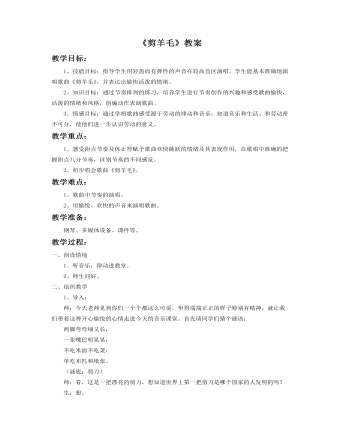
《剪羊毛》教案
- 页数:3页
- |大小:33.50KB
- 课件教案
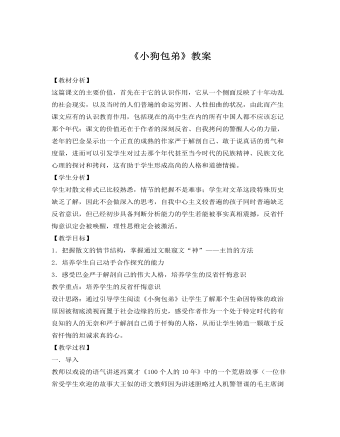
人教版高中语文《小狗包弟》教案
- 页数:8页
- |大小:29.21KB
- 课件教案
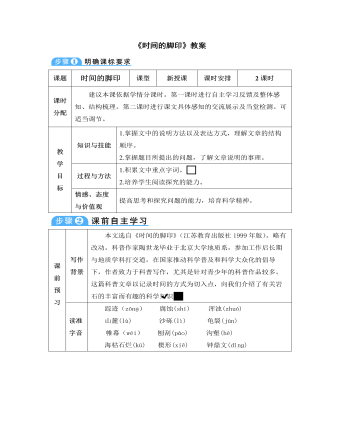
部编版语文八年级下册《时间的脚印》教案
- 页数:4页
- |大小:511.50KB
- 课件教案
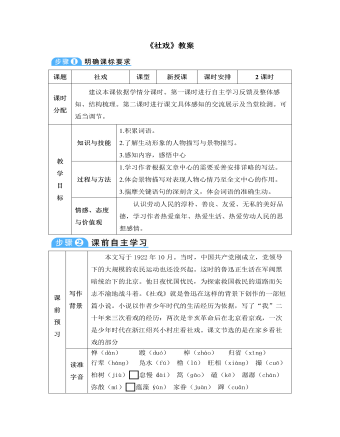
部编版语文八年级下册《社戏》教案
- 页数:8页
- |大小:340.00KB
- 课件教案

精选高中生期末评语
- 页数:42页
- |大小:7M
- 课件教案
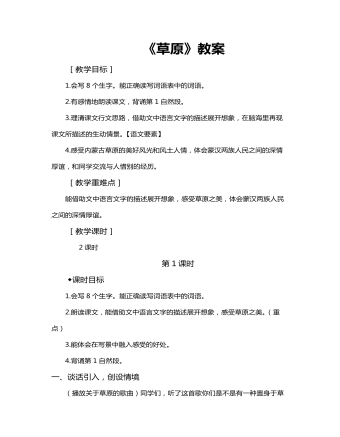
部编版六年级语文上册《草原》教案
- 页数:6页
- |大小:265.86KB
- 课件教案
今日更新

精选高中生期末评语
- 页数:42页
- |大小:7M
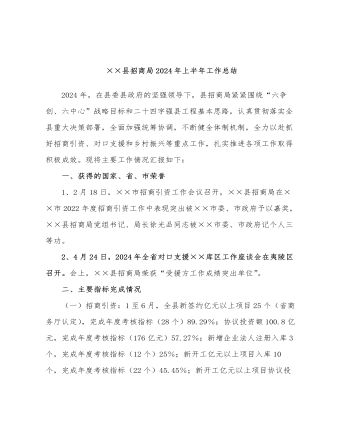
××县招商局2024年上半年工作总结
- 页数:12页
- |大小:142.54KB
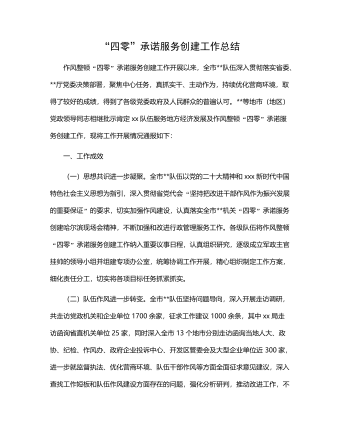
“四零”承诺服务创建工作总结
- 页数:5页
- |大小:39.83KB
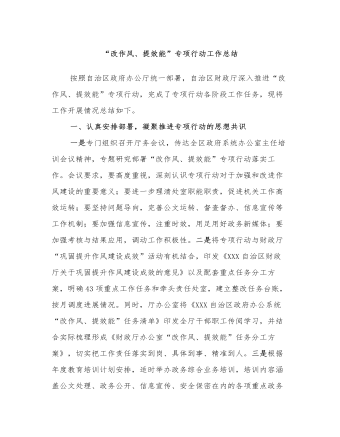
“改作风、提效能”专项行动工作总结
- 页数:6页
- |大小:139.05KB
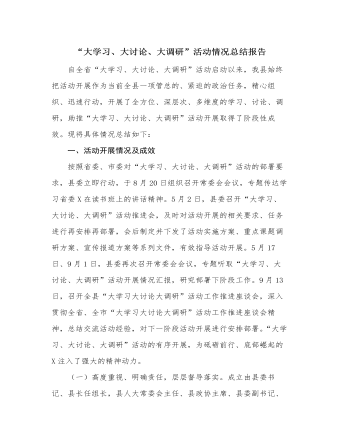
“大学习、大讨论、大调研”活动情况总结报告
- 页数:7页
- |大小:26.12KB
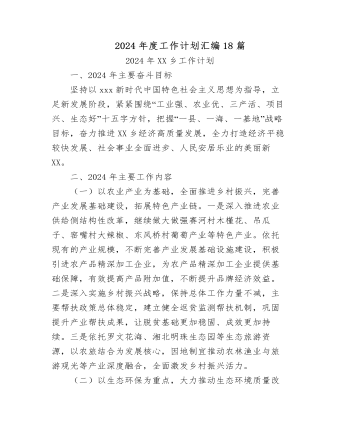
2024年度工作计划汇编(18篇)
- 页数:72页
- |大小:196.93KB








